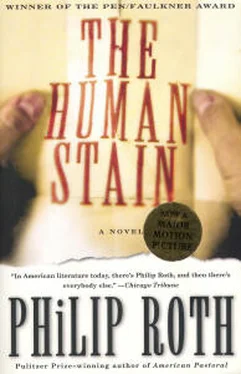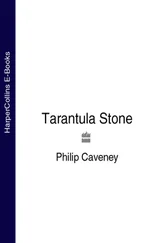At four, when I started out of my drive for the College Arms, where she was staying, the afternoon light was ratcheting rapidly down and the day, heavy now with fearsome clouds, had turned into gusty November. That morning they'd buried Coleman — and the morning before buried Faunia — in springlike weather, but now everything was intent on announcing winter. And winter twelve hundred feet up. Here it comes.
The impulse I had then, to tell Ernestine about the summer day a mere four months earlier when Coleman had driven me out to the dairy farm to watch Faunia do the five o'clock milking in the late afternoon heat — that is, to watch him watching Faunia do the milking — did not require much wisdom to suppress. Whatever was missing from Ernestine's sense of Coleman's life, she was not driven to discover. Intelligent as she was, she hadn't asked a single question about how he had lived out his last months, let alone about what might have caused him to die in the circumstance he did; good and virtuous woman that she was, she preferred not to contemplate the specific details of his destruction. Nor did she wish to inquire into any biographical connection between the injunction to revolt that had severed him from his family in his twenties and the furious determination, some forty years on, with which he had disassociated himself from Athena, as its pariah and renegade. Not that I was sure there was any connection, any circuitry looping the one decision to the other, but we could try to look and see, couldn't we? How did such a man as Coleman come to exist? What is it that he was? Was the idea he had for himself of lesser validity or of greater validity than someone else's idea of what he was supposed to be? Can such things even be known? But the concept of life as something whose purpose is concealed, of custom as something that may not allow for thought, of society as dedicated to a picture of itself that may be badly flawed, of an individual as real apart and beyond the social determinants defining him, which may indeed be what to him seem most unreal —in short, every perplexity pumping the human imagination seemed to lie somewhat outside her own unswerving allegiance to a canon of time-honored rules.
“I have not read any of your books,” she told me in the car. “I tend to lean toward mysteries these days, and English mysteries. But when I get home, I plan to take out something of yours.”
“You haven't told me who Dr. Charles Drew was.”
“Dr. Charles Drew,” she told me, “discovered how to prevent blood from clotting so it could be banked. Then he was injured in an automobile accident, and the hospital that was nearest would not take colored, and he died by bleeding to death.”
That was the whole of our conversation during the twenty minutes it took to drive down the mountain and into town. The torrent of disclosure was over. Ernestine had said all there was to say. With the result that the harshly ironic fate of Dr. Drew took on a significance — a seemingly special relevance to Coleman and his harshly ironic fate — that was no less disturbing for being imponderable.
I couldn't imagine anything that could have made Coleman more of a mystery to me than this unmasking. Now that I knew everything, it was as though I knew nothing, and instead of what I'd learned from Ernestine unifying my idea of him, he became not just an unknown but an uncohesive person. In what proportion, to what degree, had his secret determined his daily life and permeated his everyday thinking? Did it alter over the years from being a hot secret to being a cool secret to being a forgotten secret of no importance, something having to do with a dare he'd taken, a wager made to himself way back when? Did he get, from his decision, the adventure he was after, or was the decision in itself the adventure? Was it the misleading that provided his pleasure, the carrying off of the stunt that he liked best, the traveling through life incognito, or had he simply been closing the door to a past, to people, to a whole race that he wanted nothing intimate or official to do with? Was it the social obstruction that he wished to sidestep? Was he merely being another American and, in the great frontier tradition, accepting the democratic invitation to throw your origins overboard if to do so contributes to the pursuit of happiness? Or was it more than that? Or was it less? How petty were his motives? How pathological? And suppose they were both — what of it? And suppose they weren't — what of that? By the time I met him, was the secret merely the tincture barely tinting the coloration of the man's total being or was the totality of his being nothing but a tincture in the shoreless sea of a lifelong secret? Did he ever relax his vigilance, or was it like being a fugitive forever? Did he ever get over the fact that he couldn't get over the fact that he was pulling it off — that he could meet the world with his strength intact after doing what he had done, that he could appear to everyone, as he did appear, to be so easily at home in his own skin? Assume that, yes, at a certain point the balance shifted toward the new life and the other one receded, but did he ever completely get over the fear of exposure and the sense that he was going to be found out? When he had come to me first, crazed with the sudden loss of his wife, the murder of his wife as he conceived it, the formidable wife with whom he'd always struggled but to whom his devotion once again became profound in the instant of her death, when he came barging through my door in the clutches of the mad idea that because of her death I should write his book for him, was his lunacy not itself in the nature of a coded confession? Spooks! To be undone by a word that no one even speaks anymore. To hang him on that was, for Coleman, to banalize everything — the elaborate clockwork of his lie, the beautiful calibration of his deceit, everything. Spooks! The ridiculous trivialization of this masterly performance that had been his seemingly conventional, singularly subtle life — a life of little, if anything excessive on the surface because all the excess goes into the secret. No wonder the accusation of racism blew him sky high. As though his accomplishment were rooted in nothing but shame. No wonder all the accusations blew him sky high. His crime exceeded anything and everything they wanted to lay on him. He said “spooks,” he has a girlfriend half his age — it's all kid stuff. Such pathetic, such petty, such ridiculous transgressions, so much high school yammering to a man who, on his trajectory outward, had, among other things, done what he'd had to do to his mother, to go there and, in behalf of his heroic conception of his life, to tell her, “It's over. This love affair is over. You're no longer my mother and never were.” Anybody who has the audacity to do that doesn't just want to be white. He wants to be able to do that. It has to do with more than just being blissfully free. It's like the savagery in The Iliad, Coleman's favorite book about the ravening spirit of man. Each murder there has its own quality, each a more brutal slaughter than the last.
And yet, after that, he had the system beat. After that, he'd done it: never again lived outside the protection of the walled city that is convention. Or, rather, lived, at the same moment, entirely within and, surreptitiously, entirely beyond, entirely shut out — that was the fullness of his particular life as a created self. Yes, he'd had it beat for so very long, right down to all the kids being born white — and then he didn't. Blindsided by the uncontrollability of something else entirely. The man who decides to forge a distinct historical destiny, who sets out to spring the historical lock, and who does so, brilliantly succeeds at altering his personal lot, only to be ensnared by the history he hadn't quite counted on: the history that isn't yet history, the history that the clock is now ticking off, the history proliferating as I write, accruing a minute at a time and grasped better by the future than it will ever be by us. The we that is inescapable: the present moment, the common lot, the current mood, the mind of one's country, the stranglehold of history that is one's own time. Blindsided by the terrifyingly provisional nature of everything.
Читать дальше












